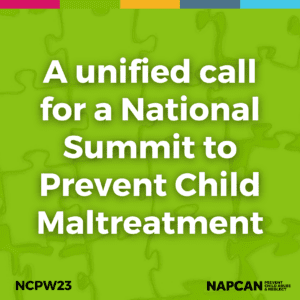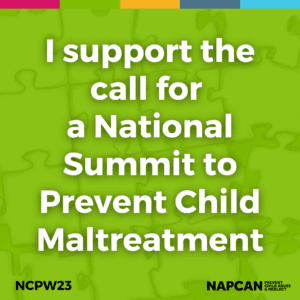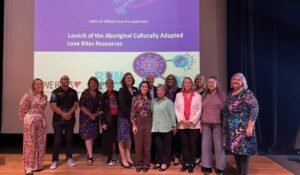
National Summit to Prevent Child Maltreatment
NAPCAN and expert partners are calling on the Commonwealth Government to host a National Summit to Prevent Child Maltreatment. This call recognises many years of work across the child welfare sector, including by researchers, practitioners and government agencies. Evidence from the recently released Australian Child Maltreatment Study means we simply cannot turn away from the reality of harm to children in Australia, and our duty to prevent this.
A National Summit is a space to bring together leaders and experts, as well as children, young people and parents/carers with lived experiences of social services, alongside practitioners and policy makers from a range of disciplines such as Health, Education, Justice, Child Protection, Treasury, Employment and Workplace Relations. It is vital to recognise that every portfolio has an impact on the life of a child, even if its only direct impact is on an adult caregiver. Children do better when their parents and caregivers are supported.
Building on years of advocacy from a wide range of passionate and informed voices, together we are calling for a sharp refocus on primary prevention.
While we could never compile an exhaustive list we know esteemed advocates and experts – such as Professor Fiona Stanley AC; Professor Emeritus Dorothy Scott AM; Dr Adam Tomison; Dr Sue Packer AO; Andrew McCallum AM; Professor Daryl Higgins and so many others; alongside organisations like SNAICC; Australian Research Alliance for Children and Youth (ARACY); Families Australia; Children’s Commissioners across Australia, Australian Institute of Family Studies (AIFS), NAPCAN; and, most importantly, those with lived experience who spoke up and shared their personal insights to help inform and evolve systems – have collectively urged us to deeply consider how we prevent harm before it occurs.
The evidence is clear that, while much great work supporting children and families is already occurring across the sector, it is largely about the important job of responding to harm, rather than stopping harm before it occurs. The time has come to recognise that prevention is the best way forward to reduce burdens on systems and increase positive outcomes for children and families. We must come together and fill this gap in policy and practice collectively, and hold ourselves accountable for the generational impacts to come. This is not something that can be achieved by any single agency, department or jurisdiction alone; but with diverse perspectives and expertise.
Where we start matters. For an issue as important as child abuse and neglect, and with so much at stake for our communities and the health of our society, we must get this right. We need to start with a National Summit to create a shared space for old strategies to be examined and for new ideas to flourish, so together we can find an outcome fit for purpose and create meaningful change. We need to come together to discuss ways to restructure and align systems, processes and resourcing to achieve safe and supportive communities for children and their families.
Together we are calling for a Summit to Prevent Child Maltreatment to ensure that every child in every community can get a fair go.
WHERE WE START MATTERS
NAPCAN and a group of respected leaders, researchers and experts are calling for a National Summit to Prevent Child Maltreatment.
We invite you to join this call.
A Summit will bring people together in a new way to:
- Bring decision and policy makers from across governments and portfolios into the same room.
- Learn from experts, academics, people working with children and families, and individuals with lived experiences from across the community.
- Build a common understanding of what we already know about child abuse and neglect.
- Talk openly and honestly about what is working and not working (and where the money is going and needs to go).
- Explore the evidence on the root causes of maltreatment and find smarter solutions to prevent abuse.
- Establish prevention of abuse as a national and whole-of-community priority.
The goal must be to ensure that as many children as possible grow up loved, safe and well in their families.
Click here to download the support tiles below.


MEDIA RELEASE – Monday 4 September 2023
NAPCAN Calls for a National Summit to Prevent Child Maltreatment
At the official launch of Child Protection Week today, the National Association for Prevention of Child Abuse and Neglect (NAPCAN) and other child experts are calling for a National Summit to Prevent Child Maltreatment.
NAPCAN CEO, Leesa Waters says keeping kids safe is the best investment we can make for a healthier, fairer Australia, now and into the future.
“It’s not fair that 3 out of 5 – that’s 60% – of Australians experience at least one form of maltreatment in childhood – either physical, emotional, sexual, domestic violence or neglect.”
Ms Waters said the key message from the recently released Australian Child Maltreatment Study (ACMS) is: ‘we can’t afford NOT to act’.
“This world-first study is an incredible opportunity for all Australians. It gives us the evidence we need – about rates of abuse, about potential impacts, and about protective factors – to show that child abuse can be prevented. Critically, it tells us loud and clear that child abuse is a community issue that requires an ‘all-hands-on-deck’ approach.”
A letter has been sent to Prime Minister, Anthony Albanese, urging the government to make children a national priority and to initiate the National Summit.
Professor Daryl Higgins, the Director of ACU’s Institute of Child Protection Studies who worked on the ACMS, says the time has come for action:
“We need national political will and action to better support families and enhance safeguarding in our schools, childcare centres, and other child-facing institutions. A National Summit is a chance to bring all stakeholders together in one room, at one time, to create a consensus around what needs to be done – urgently – to prevent harm to children.”
“A National Summit to address and implement effective and targeted primary prevention strategies is better than another Royal Commission or inquiry into the failures of child protection systems,” Professor Higgins says.
NAPCAN CEO Leesa Waters says the National Summit will link people together in a new way:
“The Summit will bring together decision-makers, community leaders, industry experts – and most importantly those with lived experiences – to talk openly and honestly about what is working and not working.”
“I believe passionately that we need to involve the voices of children and young people and their parents, every single step of the way.”
“This call recognises decades of important work across the child welfare sector, and the many organisations, researchers, practitioners and government agencies who have long been advocating for greater investment in primary prevention,” NAPCAN CEO, Leesa Waters.
Outcomes from the Summit will influence a PREVENTION strategy that has shared accountability across all levels of government – Federal, State, Territory and Local.
“By joining together we are amplifying our voices and our actions to ensure that every child in every community has the opportunity to grow up loved and safe,” said Ms Waters.
“We know that what happens to us in childhood – both positive and negative – shapes how our brains grow – and our future health and wellbeing. We need to work together to get this right.”
ENDS





